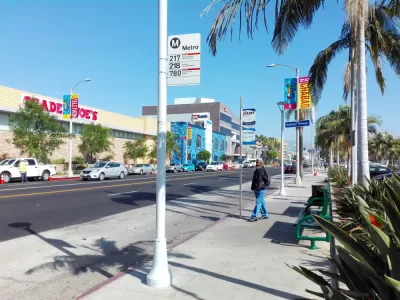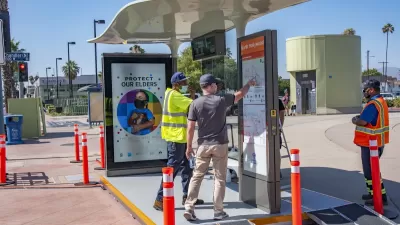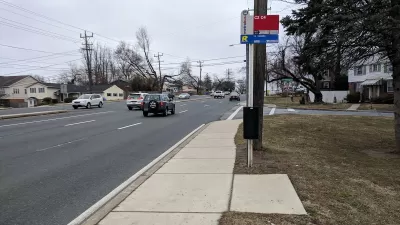As heat waves intensify, bus riders in Los Angeles are forced to wait at bus stops that offer little shade or seating, putting vulnerable residents at risk of heat stroke and other health impacts.

According to an article by Rachel Uranga in the Los Angeles Times, “Of the 12,200 bus stops served by the Los Angeles County Metropolitan Transportation Authority, only a quarter have some kind of shade or rain shelter, and only half have a seat for those waiting.”
As heat waves become increasingly deadly, Uranga asks, when will L.A. bus riders finally have adequate facilities to protect them while they wait for the city’s (often late) buses?
“While the average trip on a Metro bus is less than five miles, about half the time of that journey is spent looking down the road for signs of a bus.” As Uranga points out, “The searing weather is yet another setback for largely low-income bus riders who often face long, difficult commutes.” The city is working on a contract to add more shelters to bus stops in its jurisdiction, but the project could take years.
While Los Angeles may be known for historically mild weather, those days are essentially over. Juan Matute, deputy director of the UCLA Institute of Transportation Studies, says “Climate change is changing the baseline of all these past decisions.” To protect vulnerable residents, “Transit advocates say the agencies need to look to desert cities like Phoenix, where bus stop canopies equipped with misters and fans to cool riders have been installed.”
FULL STORY: Heat waves are getting worse. When will L.A. get around to offering bus riders more shade?

Maui's Vacation Rental Debate Turns Ugly
Verbal attacks, misinformation campaigns and fistfights plague a high-stakes debate to convert thousands of vacation rentals into long-term housing.

Planetizen Federal Action Tracker
A weekly monitor of how Trump’s orders and actions are impacting planners and planning in America.

In Urban Planning, AI Prompting Could be the New Design Thinking
Creativity has long been key to great urban design. What if we see AI as our new creative partner?

Pedestrian Deaths Drop, Remain Twice as High as in 2009
Fatalities declined by 4 percent in 2024, but the U.S. is still nowhere close to ‘Vision Zero.’

King County Supportive Housing Program Offers Hope for Unhoused Residents
The county is taking a ‘Housing First’ approach that prioritizes getting people into housing, then offering wraparound supportive services.

Researchers Use AI to Get Clearer Picture of US Housing
Analysts are using artificial intelligence to supercharge their research by allowing them to comb through data faster. Though these AI tools can be error prone, they save time and housing researchers are optimistic about the future.
Urban Design for Planners 1: Software Tools
This six-course series explores essential urban design concepts using open source software and equips planners with the tools they need to participate fully in the urban design process.
Planning for Universal Design
Learn the tools for implementing Universal Design in planning regulations.
planning NEXT
Appalachian Highlands Housing Partners
Mpact (founded as Rail~Volution)
City of Camden Redevelopment Agency
City of Astoria
City of Portland
City of Laramie





























